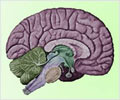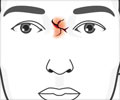- Nose-picking habit can raise the risk of Alzheimer’s disease
- Germs entering through nostrils trigger neuroinflammation, causing ‘tau’ and ‘amyloid’ protein deposits in the brain, resulting in Alzheimer’s disease
- Emphasizes the essentials of hand hygiene in preventing nasal-route Alzheimer’s risk
Neuroinflammation in Alzheimer‘s Disease: A Potential Role of Nose-Picking in Pathogen Entry via the Olfactory System?
Go to source).
Nose Picking and Alzheimer's: Unearthing a Surprising Connection
In the new study, researchers from Western Sydney University in Australia proposed a hypothesis that neuroinflammation in Alzheimer's might be partly triggered by pathogens, including viruses, bacteria, and fungi, entering the brain through the nose and olfactory system.The chronic habit of nose picking, medically known as rhinotillexomania, introduces germs into the delicate nasal cavity, causing inflammation in the brain, which has been associated with the onset of Alzheimer's disease.
Did You Know?
An estimated 6.7 million Americans age 65 and older are living with Alzheimer's disease, according to Alzheimer’s Association.
Alzheimer's is characterized by the accumulation of amyloid and tau substances in the brain, forming plaques and tangles that hinder brain function.
The researchers propose that neuroinflammation, triggered by injury or infection, may also play a partial role in the disease's development. External pathogens entering the brain through the olfactory system, including herpes, COVID-19 viruses, or bacteria causing respiratory infections, are considered potential contributors to neuroinflammation.
Read More to Know About ‘Bacteriophages Packed Nasal Spray to Ward Off Alzheimer's on the Anvil’
Insights from Previous Studies
Previous studies, such as one conducted by Griffith University on mice, found a connection between nose-picking and the buildup of proteins associated with Alzheimer's disease (2✔ ✔Trusted SourceChlamydia pneumoniae can infect the central nervous system via the olfactory and trigeminal nerves and contributes to Alzheimer‘s disease risk
Go to source). Tests involving a bacteria called Chlamydia pneumoniae suggested that the habit could damage protective internal tissues, making it easier for harmful bacteria to reach the brain.
Self-Hygiene: A Simple Defense Against Alzheimer's Risk
In light of these findings, the researchers recommend emphasizing hand hygiene as a preventive measure. They suggest that improving hand hygiene, a lesson learned from the COVID-19 pandemic could be a straightforward prevention step.The team also acknowledges the ongoing debate about whether nose picking causes Alzheimer's or if the disease prompts individuals to adopt unhealthy habits leading to brain inflammation and the findings still remain elusive.
To sum up, the nose-picking habit is associated with an elevated risk of Alzheimer's disease, and maintaining proper hand hygiene stands as a simple preventive measure against this avoidable condition.
References:
- Neuroinflammation in Alzheimer’s Disease: A Potential Role of Nose-Picking in Pathogen Entry via the Olfactory System? - (https://www.mdpi.com/2218-273X/13/11/1568)
- Chlamydia pneumoniae can infect the central nervous system via the olfactory and trigeminal nerves and contributes to Alzheimer’s disease risk - (https://www.ncbi.nlm.nih.gov/pmc/articles/PMC8854390/)
Source-Medindia












